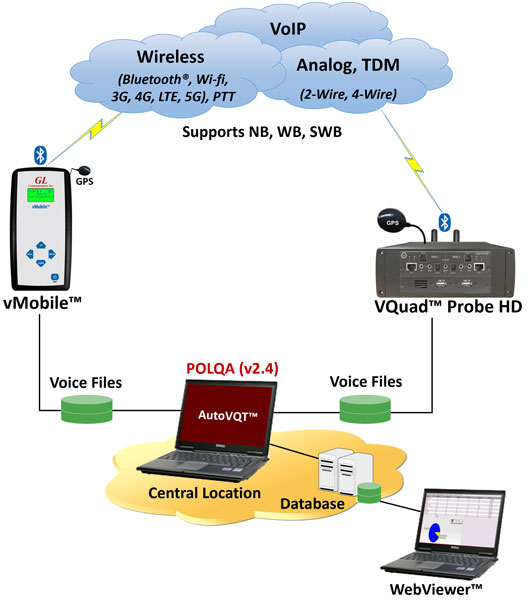Enhanced Solutions for Automated Voice Quality Testing and Monitoring
GL Communications Inc., a global leader in telecom test and measurement solutions, addressed the press regarding their Automated Voice Quality Testing software (AutoVQT).
GL’s AutoVQT is an innovative automated solution designed to analyze thousands of voice files, utilizing the industry renowned POLQA algorithm. This breakthrough technology evaluates voice communication quality seamlessly across various networks, including VoIP, Wireless, and PSTN.

According to Robert Bichefsky, Director of Engineering at GL Communications Inc., ” AutoVQT™ leverages the Perceptual Objective Listening Quality Assessment (POLQA per ITU-T P.863 version 2.4) algorithm, which is widely acknowledged as the industry benchmark for assessing voice quality to deliver highly accurate and reliable results, ensuring that voice quality testing is precise and up to industry standards.”
Recommended AI Interview: HealthTech and SportsTech Applications: Stepping up AI Capabilities with Investments in 2024
Robert Bichefsky further elaborated on the benefits, stating, “GL’s AutoVQT™ is an automated solution that analyzes thousands of voice files using the POLQA algorithm in mere minutes. The analyzed POLQA results are easily accessible through log files and our centralized database system – WebViewer™. This system offers advanced features such as filtering, querying, and generating custom reports, providing users with a holistic view of voice quality across various networks. The application seamlessly integrates with GL’s VQuad™, vMobile™, Voice Analysis Tool (VAT™), Message Automation and Protocol Simulation (MAPS™), or T1 E1 Analysis platforms. This integration significantly reduces analysis time and increases efficiency in voice quality testing.”
The AutoVQT™ application is adaptable with the Voice Quality server software running on Windows® PC and client software supporting Windows®/Linux® platforms. This allows users to analyze large quantities of PCM/WAV files from any network, employing Narrowband (NB)/Wideband (WB)/Super Wideband (SWB) sampling rates and notably reducing analysis time. The application works fast to analyze and generate POLQA MOS for thousands of PCM files at the same time, even when they have different sampling rates (300 NB, 300 WB, and 400 SWB files).
GL Communications Inc. also announces the AutoVQT™ Command Line Interface (CLI), a remote-control feature for AutoVQT™ server nodes. This CLI supports various commands, enabling users to conduct analyses with customized configurations, utilize AutoVQTProfile.ini settings, switch Auto Test Modes, save and transfer captured events, and perform other essential operations.
With AutoVQT™ and its CLI, GL Communications Inc. continues to lead in innovative solutions, providing businesses with unparalleled tools for maintaining optimal voice quality across evolving networks.
Recommended AI Interview: McAfee at CES 2024: Deepfake Audio Detection Technology using AI
Key Features
- Analyze thousands of bulk PCM/WAV voice files in mere minutes
- Supports multiple clients connecting to the server
- The Auto Test feature allows immediate analysis of Degraded PCM files based on the user-defined configuration settings
- AutoVQT™ analysis results include POLQA MOS, E-Model R-Factor, Signal Level, Noise Level, Delay (requires simultaneous Send and Record of the voice files), Jitter, and Clipping
- Provides remote monitoring with result query and real-time statistics using web based WebViewer™
- Enables real-time mapping of results directly on Google Maps during Drive or Walk testing when used in conjunction with VQuad™ or vMobile™
- Remote control of AutoVQT™ through CLI
GL Communications is a global provider of telecom test and measurement solutions. GL’s solutions are used to verify the quality and reliability of Wireless (5G, 4G, 3G, 2G), SONET/SDH, Ethernet/IP, TDM, and PSTN networks.
Recommended AI News: DH2i Launches DxOperator for Simplified SQL Server Container Deployment on Kubernetes
[To share your insights with us as part of editorial or sponsored content, please write to sghosh@martechseries.com]








Comments are closed.